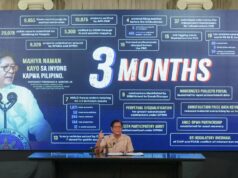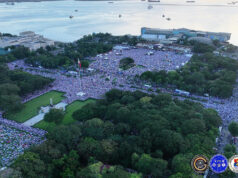Baguio to launch cashless payment system for public transport
BAGUIO CITY is launching on Monday, July 13, a cashless payment system for public transportation, including jeepneys, taxis, and UV Express, through a partnership with SquidPay Technology Inc. In a statement Sunday, Mayor Benjamin B. Magalong said the city “is on the right track in pursuing cashless fare payment systems considering the alarming increase in the number of transport workers infected by the coronavirus disease 2019 (COVID-19).” He added, “Although most of those affected are in the railway business, the public utility vehicle sector remains at risk for using direct payment scheme that does not inhibit physical interaction,” referring to the MRT-3 in Metro Manila where over 200 of its personnel recently tested positive for COVID-19. SquidPay has already conducted seminars with members of transport groups in preparation for the cashless system that was first presented on June 24. The city government said the system does not charge a fee per transaction, but vehicle owners need to shell out a refundable deposit for the payment machine. Commuters will have to pay an initial P100 for the card, which includes a P45 fare value. The company will set up booths in terminals, barangay centers, and other strategic areas for card reloading. Mr. Magalong said aside from being “aligned with the new normal measures now being implemented in view of the continuing COVID threat,” adopting the contactless system is part of the city’s “Smart City and digital transformation programs being pursued even before the health crisis.”
Davao City modifies national motorcycle back-riding policy; rules relationship insignificant with health protocols
DAVAO CITY has modified the national policy on motorcycle back-riding, allowing a passenger to ride pillion regardless of relationship to the driver as long as health safety requirements are observed. In an order released Friday, Mayor Sara Duterte-Carpio directed the local police and traffic management enforcers to observe “maximum tolerance” on the riders’ relationship saying “the relationship between the driver and the passenger is inconsequential given that these will be the same requirements that will be required for other individuals unrelated to each other.” The requirements include both riders wearing a face mask and crash helmet, and the use of a barrier “that covers the neck and does not extend beyond the top of the head of the driver.” The memo includes a photo of a sample wearable barrier that “is similar to a backpack.” Before the release of the memorandum order, Ms. Carpio, a known motorcycle enthusiast, already noted that the barrier required by the national government would make driving difficult. “We have seen that the sample barrier they presented makes it difficult for the driver,” she said over the local government-run radio. The mayor said the backpack-type barrier “is a better option” and with approval from health authorities.
MMDA trumpets faster travel time within Metro Manila
THE METROPOLITAN Manila Development Authority (MMDA) said travel time within the nation’s capital has become faster compared to before the lockdown period, citing that the limited buses allowed to resume operations are more compliant with road rules. MMDA General Manager Jose Arturo S. Garcia, in a radio interview over DZBB on Sunday, said the new transportation protocols being implemented in the current eased quarantine period has minimized traffic congestion. “Kung babyahe ko (If I were to travel) from Monumento to Cubao, it will take three hours or more, ngayon isang oras na eh. Ang travel time ng commuters natin, malaki ang improvement at magtutuloy tuloy pa yan (now, it’s just one hour. The travel time for commuters has improved greatly and that will continue),” he said. Monumento to Cubao via EDSA is about 13 kilometers. Aside from limiting the number of city buses given license to provide service, those operating are strictly monitored to stick to designated lanes and stop only at designated drop-off and pick-up points, he said. Mr. Garcia also noted that traffic flows better despite the continued suspension of the number coding scheme, which prohibits vehicles from being on the road once a week based on the last number of the plate. — Gillian M. Cortez



